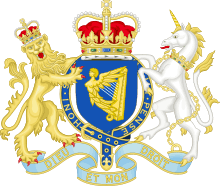Disenfranchising Act
 | |
| Citation | 1 Geo II c.9 |
|---|---|
| Dates | |
| Royal assent | 6 May 1728 |
| Repealed | 1793 |
Status: Repealed | |
The Disenfranchising Act was an Act of Parliament of the Parliament of Ireland passed in 1727, one of a series of Penal Laws, prohibiting all Roman Catholics from voting. Its full title is "An Act for the further regulating the Election of Members of Parliament, and preventing the irregular Proceedings of Sheriffs and other Officers in electing and returning such Members" and its citation is 1 Geo II c.9. It received royal assent on 6 May 1728.[1]
At that time elections were held only on the start of a new reign, and so the Act followed the death of George I in 1727 and came into practical effect from 1728. The Act was repealed in 1793, allowing the vote to all males holding a property with a rental value of at least two pounds annually.
See also
References
External links
This article is issued from
Wikipedia.
The text is licensed under Creative Commons - Attribution - Sharealike.
Additional terms may apply for the media files.